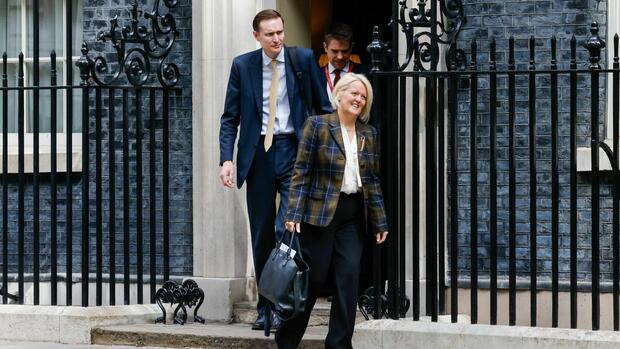Alison Rose, CEO of the Natwest Group (right) and her communications chief Alex Dawtrey leave 11 Downing Street after meeting Treasury Secretary Jeremy Hunt.
(Photo: Bloomberg)
London Just a day after the Bank of England raised interest rates in the UK to 5%, Treasury Secretary Jeremy Hunt and UK bank officials have agreed to offer help to distressed mortgage borrowers. All major banks in the City of London and the most important building societies were involved.
Accordingly, there should be a one-year period for homeowners who fall behind with their installment payments before the banks can seize the property. This is intended to prevent a sharp increase in foreclosures. “The last thing they (the banks) want to do is impound a house,” Hunt said after the meeting.
It was therefore agreed “in this extreme situation” that there would be a minimum period of twelve months before confiscation could take place without consent. In addition, borrowers should be able to switch to repayment-free loans or extend the term. If the borrowers return to their originally agreed terms within six months, their creditworthiness will not be negatively affected by the debt restructuring.
Discussions with the banks about deferred payments should also remain without consequences. “The most important thing is that customers can call their bank or mortgage lender and explain their situation without worrying about it affecting their creditworthiness,” Hunt said
The Finance Minister asked the banks for talks on Friday after mortgage rates in Great Britain had recently risen sharply. The interest rate for two-year loans is now over six percent.
Interest rates on real estate loans have more than doubled
After the Bank of England raised interest rates by 50 basis points on Thursday in response to high inflation and the financial markets have already priced in further interest rate increases of up to six percent by the end of the year, many homeowners are worried about their financing.
Negative pressure
800,000
mortgagee
in the UK need follow-up financing by the end of the year.
Around 800,000 mortgage holders will need follow-up financing by the end of the year. By the end of 2024 there will be 2.4 million. However, according to the financial platform Moneyfacts, interest rates on loans with a term of two years have risen from 2.56 to 6.19 percent on average since 2021.
According to the Institute for Fiscal Studies (IFS), on average, homeowners are paying around £280 more a month for their mortgages than a year ago. This would reduce disposable income by more than eight percent.
The British real estate market has also been affected by the mortgage crisis. First-time buyers in particular are finding it difficult to shoulder the sharp rise in monthly payments. The IFS estimates that 1.4 million Britons under the age of 40 will lose 20 percent of their income as a result of higher interest rates.
More: Bank of England raises key interest rate surprisingly sharply to 5.0 percent
